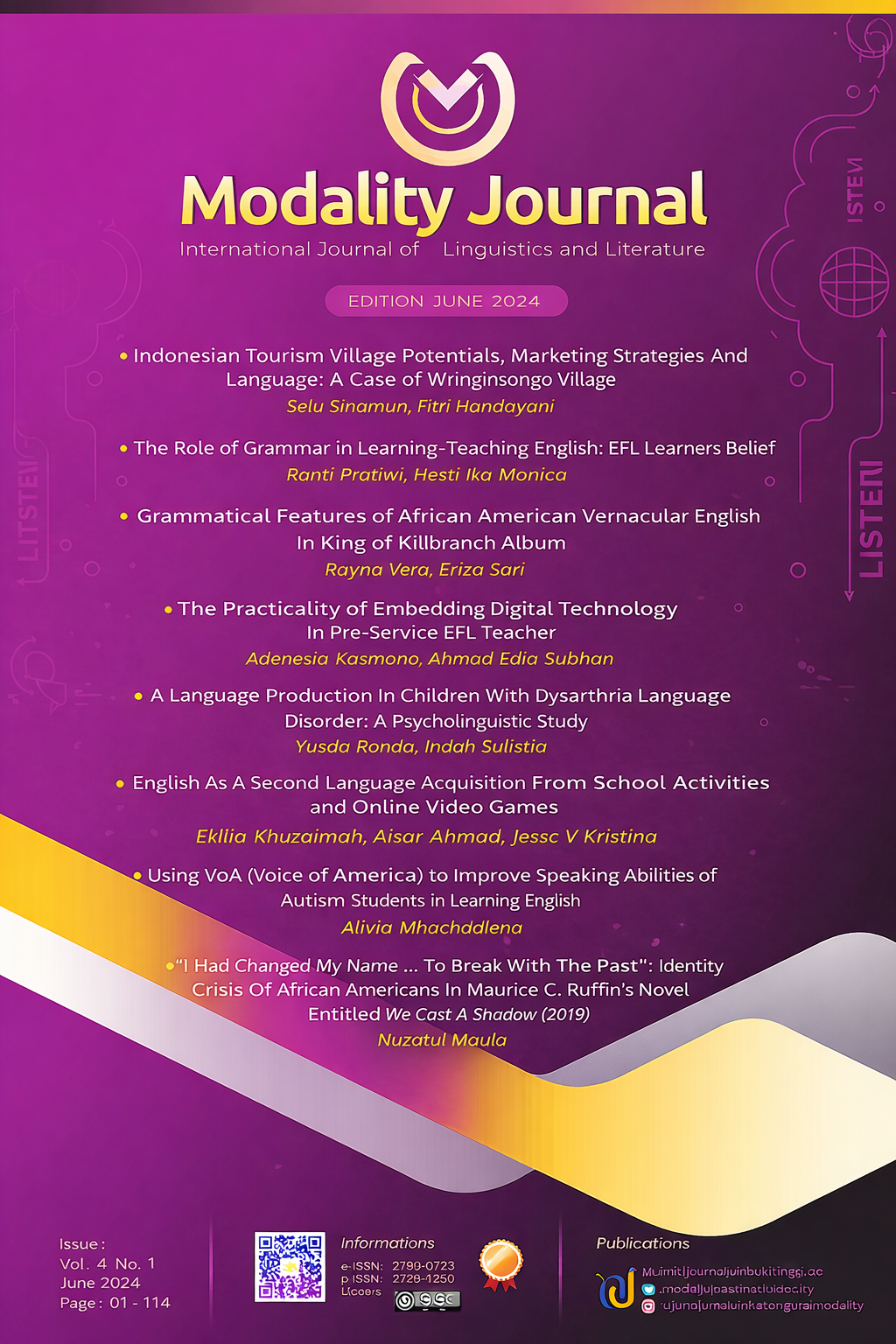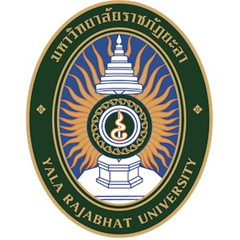“I Had Changed My Name … To Break With The Past”: Identity Crisis Of African Americans In Maurice C. Ruffin’s Novel Entitled We Cast A Shadow (2019)
DOI:
https://doi.org/10.30983/mj.v4i1.8426Keywords:
African-American Identity, identity crisis, postcolonialAbstract
This study explores identity crisis in Maurice Carlos Ruffin's We Cast A Shadow (2019), focusing on African Americans' struggles for societal acceptance and personal fulfillment. Anchored in Franz Fanon's postcolonial theory (2008), the analysis examines the protagonist's negotiation of identity against a backdrop of historical oppression and systemic racism. The study employs a detailed literary analysis of the novel's prose to reveal how the protagonist's journey from childhood adversity to adulthood reflects a broader quest for self-actualization amid prejudice and inequality. Central to this exploration is the protagonist's aspiration to transcend their Blackness and assimilate into the dominant White American paradigm, highlighting the impact of internalized racism and societal pressures. The narrative poignantly depicts the erosion of the protagonist's agency as they resort to drastic measures to conform to an idealized standard of beauty and acceptance. This transformation into a semblance of Whiteness serves as a powerful allegory for the existential struggles of marginalized individuals navigating identity politics. Through a nuanced analysis of textual motifs and character dynamics, this study underscores the ongoing relevance of identity crises in contemporary discourse and emphasizes the need for societal introspection and transformation toward racial equity and inclusion.
Abstrak
Studi ini mengeksplorasi krisis identitas dalam novel We Cast A Shadow (2019) karya Maurice Carlos Ruffin, dengan fokus pada perjuangan orang Afrika-Amerika untuk diterima oleh masyarakat dan memenuhi kebutuhan pribadi. Berdasarkan teori postkolonial Franz Fanon (2008), analisis ini meneliti negosiasi identitas protagonis dalam konteks penindasan sejarah dan rasisme sistemik. Studi ini menggunakan analisis sastra yang mendetail dari prosa novel untuk mengungkap bagaimana perjalanan protagonis dari masa kanak-kanak yang penuh kesulitan hingga dewasa mencerminkan pencarian jati diri yang lebih luas di tengah prasangka dan ketidakadilan. Pusat dari eksplorasi ini adalah aspirasi protagonis untuk melampaui kulit hitam mereka dan berasimilasi ke dalam paradigma Dominan Kulit Putih Amerika, menyoroti dampak rasisme internal dan tekanan masyarakat. Narasi ini secara menyentuh menggambarkan pengikisan agensi protagonis ketika mereka resorting pada langkah drastis untuk menyesuaikan diri dengan standar kecantikan dan penerimaan ideal. Transformasi ini menjadi kesamaan dengan kulit Putih berfungsi sebagai alegori yang kuat untuk perjuangan eksistensial individu terpinggirkan dalam politik identitas. Melalui analisis mendalam terhadap motif tekstual dan dinamika karakter, studi ini menekankan relevansi berkelanjutan dari krisis identitas dalam wacana kontemporer dan menekankan perlunya introspeksi masyarakat dan transformasi menuju kesetaraan dan inklusi rasial.
Kata Kunci: Identitas Afrika-Amerika, Krisis Identitas, Pascakolonial.
References
Chaudhry, A. (2016). A Critical Analysis on the Identity Crisis in Jhumpa Lahiri's ‘The Namesake’. (RJELAL) Research Journal of English Language and Literature Vol.4.Issue 4. 2016, 205-208 http://www.rjelal.com; (ISSN: 2395- 2636) Retrieved August 2021
Deng, F.M. (1995). Introduction War of Visions: Conflict of Identities in Sudan. Washington, D.C: Brookings Institution Press www.jstor.org/stable/10.7864/j.ctvf3w38t.4 . Retrieved March 2021
Dizayi, S. (2016). Immigrants Identity Crisis in The Lonely Londoners. IRA- International Journal of Management & Social Sciences (ISSN 2455-2267), 4(1). doi:http://dx.doi.org/10.21013/jmss.v4.n1.p17
Fanon, F. (2008). Black Skin White Masks. London: Pluto.
Faubion J.D. (1982). The Subject and Power of Foucault (Vol. 3, pp.326-348). London: Penguin
Fearon, D, J. (1999). What is Identity? Stanford: Stanford University Press.
Frosh, S. (1991). Identity Crisis: Modernity, Psychoanalysis, and the Self. London: Macmillan.
Handayani, R. (2020). Being Muslim Immigrants in America: Preservation, Resistance, and Negotiation of Identity in Ayad Akhtar’s American Dervish. Vivid: Journal of Language and Literature.Vol.9(2): http://jurnalvivid.fib.unand.ac.id/index.php/vivid/article/view/177/183
Husna, F & Marlina, L. (2020). Showing Identity and Proudness as Black Women in Three Poems I am a Black Woman (1970) by Mari Evans, A Woman Speaks (1997) by Audre Lorde, I am More Than That (2018) by Lindiwe Princess Maseko. E-Journal English Language and Literature. Vol. 9(1): 22-31. DOI : https://doi.or/10.24036/ell.v9i1.107803.
Randa, A & Marlina, L. (2020). At The Crossroads of Identity in Mohsin Hamid’s Novel Exit West (2017). E-Journal English Language and Literature. Vol 9 (1): 87-97. DOI : https://doi.org/10.24036/ell.v9i1.107587
Ritma, R & Marlina, L (2021). Racial Discrimination in Novel We Cast A Shadow (2019) by Maurice Carlos Ruffin. Vol. 10 (1):69-76. DOI: 10.24036/ell.v10i1.115208.
Ruffin, C. Maurice. (2019). We Cast A Shadow. London: One World.
Setiawan, A & Marlina, L. (2020). The Exploitation of Migrant Workers in Atticus Lish's Novel Preparation for The Next Life (2014). E-Journal English Language and Literature. Vol. 9 (1): 2-12. DOI : https://doi.org/10.24036/ell.v9i1.108044.
Downloads
Published
How to Cite
Issue
Section
Citation Check
License
Copyright (c) 2024 Mrs. Lina, Rika Handayani, Delvi Wahyuni, Ritma Ritma

This work is licensed under a Creative Commons Attribution-ShareAlike 4.0 International License.
Authors who publish with this journal agree to the following terms:
- Authors retain copyright and grant the journal right of first publication with the work simultaneously licensed under a Creative Commons Attribution License that allows others to share the work with an acknowledgment of the work's authorship and initial publication in this journal.
- Authors are able to enter into separate, additional contractual arrangements for the non-exclusive distribution of the journal's published version of the work (e.g., post it to an institutional repository or publish it in a book), with an acknowledgment of its initial publication in this journal.
- Authors are permitted and encouraged to post their work online (e.g., in institutional repositories or on their website) prior to and during the submission process, as it can lead to productive exchanges, as well as earlier and greater citation of published work (See The Effect of Open Access).




